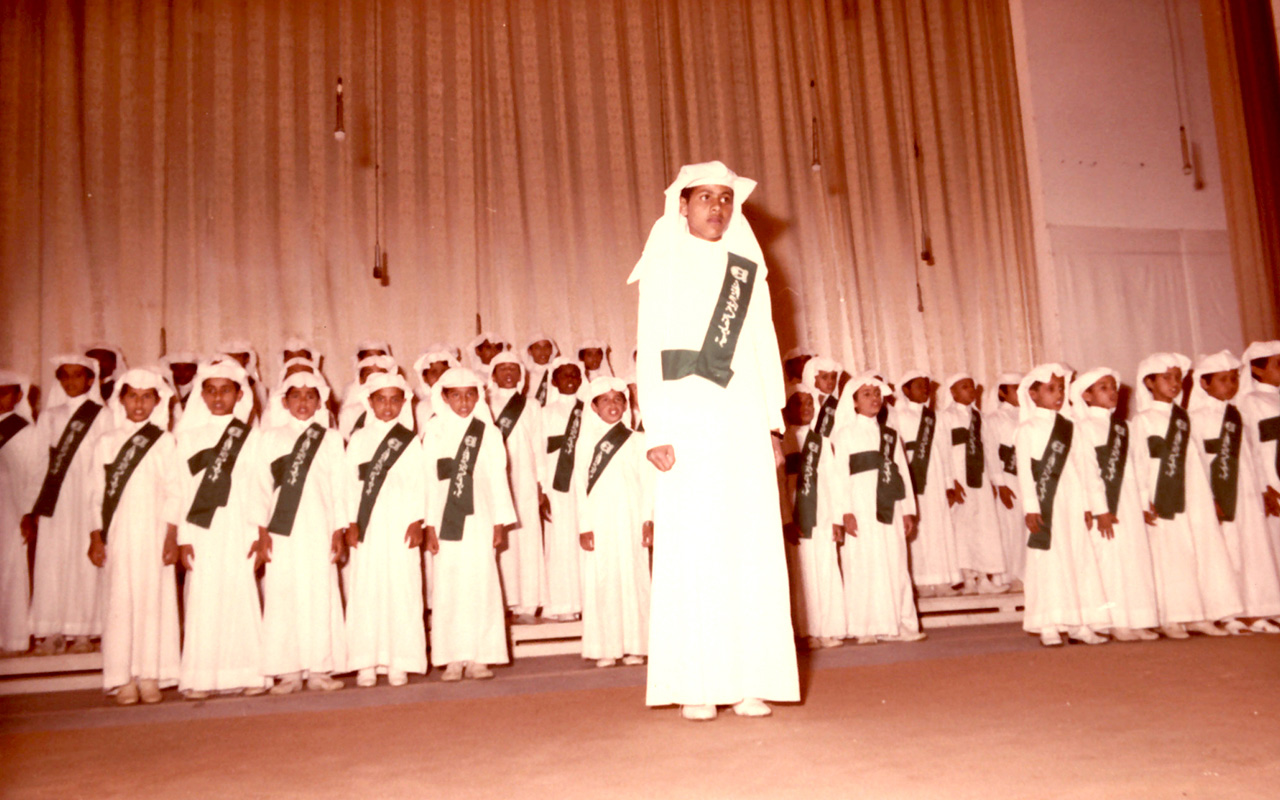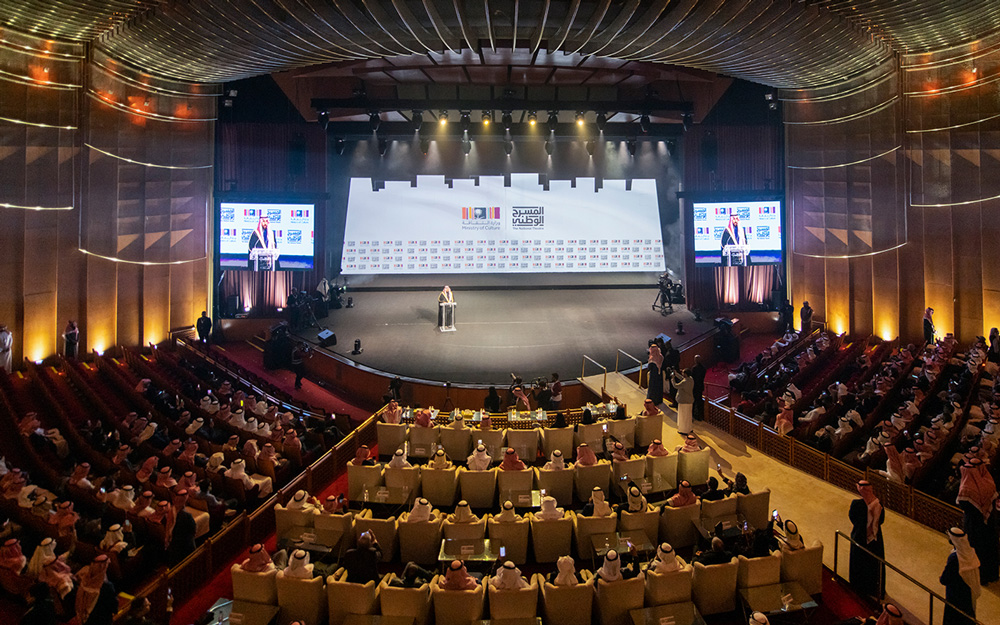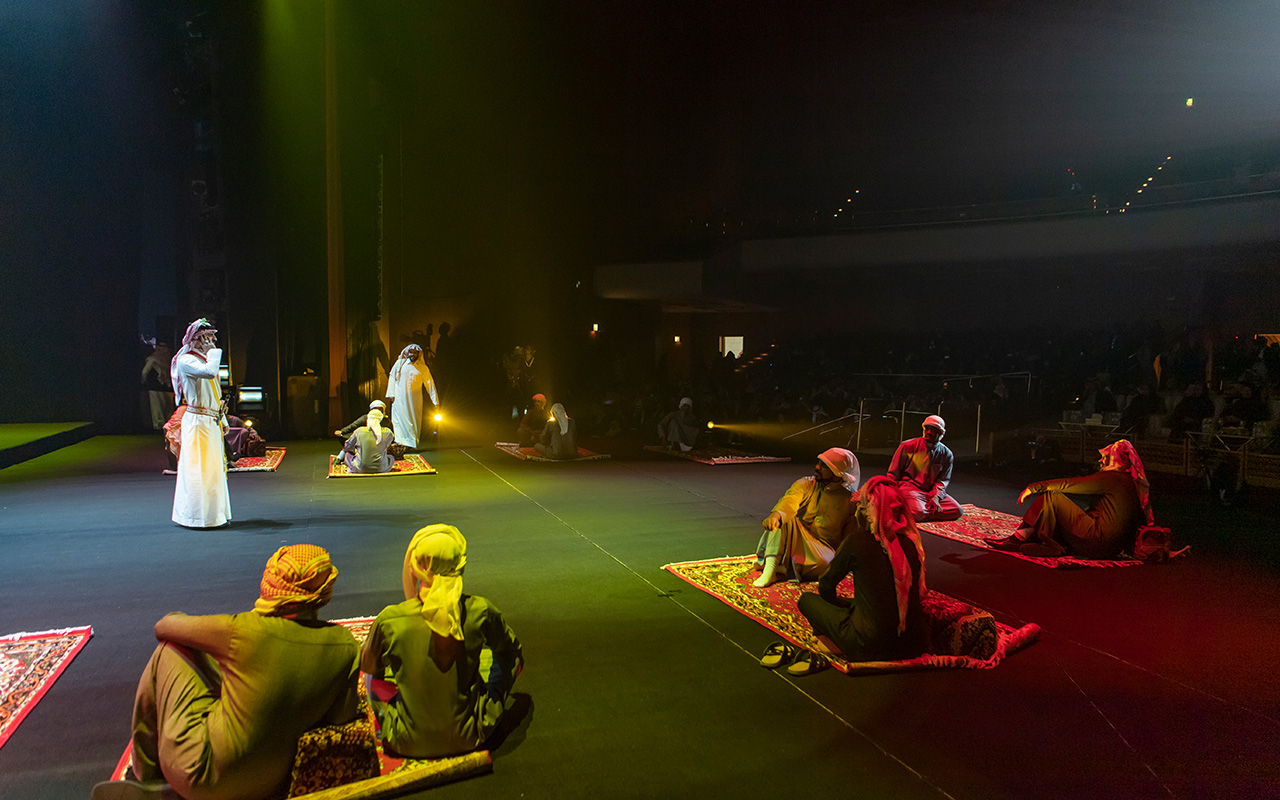Theater in Saudi Arabia
Theater in the Kingdom of Saudi Arabia encompasses all aspects of theatrical activities, including writing, performing, and theaters around the Kingdom. Its regulations and laws are managed, regulated, and enacted by the Ministry of Culture, represented by the Theater and Performing Arts Commission. Theater arts is a scientific specialization offered by the Ministry of Culture’s external scholarship program.
Saudi theater pioneers
Several pioneers emerged in theatrical writing and enriched Saudi theater. They were the first to excel in theatrical writing. They worked towards establishing theaters and presenting shows. This began as early as 1932, through several individual attempts to establish Saudi theater even before the emergence of theaters themselves. Poet Hussein Abdullah Siraj wrote several plays, starting with al-Zalem Nafseh (The Unjust to Himself) in 1932, followed by 'Jamil and Buthaynah' in 1942, and Gharam Walladah (Walladah's Love) in 1952.
Ahmad Abd al-Ghafur Attar practiced literary theatrical writing and penned al-Hijra'(Migration) and al-Malhama (The Epic) in 1946. Abdullah Abduljabbar wrote al-'Am Sahnun (Uncle Sahnun) in 1952, and Mohammed Malibari penned Fath Makkah (The Conquest of Makkah) and Musaylimah al-Kazzab (Musaylimah the Liar) in 1960.
Theatrical performances in Saudi Arabia
By 2019, the number of theatrical performances in the Kingdom had reached 125, and they were presented on the stages of cultural and art associations distributed across thirteen administrative provinces of the Kingdom. In 2022, theatrical production in the Kingdom increased to 150 performances.
Development phases of theater in Saudi Arabia
Establishment of theater in Saudi Arabia
The early manifestations of Saudi theater appeared through theatrical writings published in local newspapers and magazines. In 1932, a play by Saudi poet Hussein Saraj entitled al-Zalem Nafseh (The Unjust to Himself), was the stepping stone for theatrical practices in the Kingdom

History of theater in Saudi Arabia
Theatrical writing remained the only active element of the Saudi theatrical movement for around thirty-seven years before holding a theatrical performance in 1969, entitled Thaman al-Hurriya (The Price of Freedom), in the capital, Riyadh. As for school performances, they preceded public performances and playwriting, as they saw the light of day in 1928, when the play Bayn al-Jahel wal Mota'alem (Between the Ignorant and the Educated) was performed at the private school in Unayzah, in Qassim Province. In 1935, founding King Abdulaziz Bin Abdulrahman Al Saud attended a number of school plays, one of which was entitled Kassra wal Wafd al-Arabi (Kassra and the Arab Delegation).
School or university theater groups also participate in local and international festivals. In 2009, the King Abdulaziz University group, representing the Kingdom, participated in the International Festival of University Theater in Tunisia, alongside other theater groups from twenty countries. The King Abdulaziz University group participates in the festival annually, and its most prominent rendition was of a Saudi play entitled al-Mi'taf (The Coat).
The Ministry of Education supervises a number of cultural festivals specialized in evaluating the performance of educational theater groups. These festivals include the Theater Groups Festival, which is hosted annually by an education department within a different Saudi governorate.
The journalistic and literary publishing movement in Makkah al-Mukarramah City contributed to the first attempts to establish a theater in the Kingdom in 1960, at the hands of the Saudi writer Ahmed Siba'i, under the name Dar Quraysh for Story Acting.
Traditional texts and religious stories represented the basis for theater in the Kingdom. Later, it relied on the texts of Saudi writers and poets, as well as plays inspired by international writings, such as Tabib bil-Mish'ab (Doctor in the Valley) in 1973, a rendition of The Doctor in Spite of Himself, a play by French writer Molière. At a later stage, local dramatic texts, which express social transformations, rose to fame.
In the beginning, Saudi theater was marked by its romantic nature, expressing social and realistic, then experimental tragedies.
Platforms that influenced the evolution of Saudi theater
With the advent of Saudi television broadcast in the 1960s, television theater was founded. It introduced its audiences to a range of actors, voice artists, and various artistic paintings. During the next decade, television started recording and broadcasting Saudi plays, the first of which was Razza wal Batn al-Khali (Razza and the Empty Tummy) in 1973. Moreover, singing evenings led by prominent Saudi names, such as Mohammed Abdu, Talal Maddah, and Abadi al-Johar, were broadcast. Saudi television also fostered local talents who paved their theatrical artistic path through this platform. Moreover, several comedic plays made their debut on Saudi television, and were then recorded and broadcasted on special occasions.
At the time, the Saudi theater ecosystem was managed by individual and amateur initiatives until the establishment of the first government entity concerned with theater in 1973, under the name Saudi Society for Culture. Later, its name was changed to the Saudi Arabian Society for Culture and Arts (SASCA).
A turning point in the history of Saudi theater
The 1970s and 1980s marked the peak of the theatrical activity in the Kingdom's major cities due to the establishment of SASCA branches, in addition to the effectiveness of university theaters in the Kingdom, and the creation of literary clubs in Riyadh, Makkah, Jeddah, Madinah, Jazan, and Taif. Commercial theaters stood out, which were thriving in the holiday seasons, national days, and summer holidays. In 2019, the Ministry of Culture established the first Saudi national theater, the King Fahd Cultural Center. The play Draysh al-Nour was the first theatrical work presented there in 2020.
The theater sector was overseen by the Ministry of Culture and Information (now the Ministry of Media), and was later transferred to the Ministry of Culture in 2018. In 2020, a dedicated entity called the 'Theater and Performing Arts Commission' was established to manage theater. Theater has been treated as a component of the Quality of Life Program since the announcement of Saudi Vision 2030, as a vision realization program (VRP) aiming for social and economic development.
Women in Saudi theater
Women's theater has slowly evolved in the Kingdom on the margin of public theater. Women were active in playwriting long before they acted on stage. In 1987, a play titled al-Mawt al-Akheer lil-Momathel (The Final Death of the Actor) was published by Saudi novelist Raja'a Alem, winner of the International Prize for Arabic Fiction 2011 for her novel 'The Doves' Necklace'.
At that time, women's role in theater was limited to occasional shows in women's associations, schools, and universities, and to the establishment of university or independent theater groups specialized in writing, acting, and performing. Starting in 2018, changes associated with Saudi Vision 2030 increased women's participation in public plays. Furthermore, the Theater and Performing Arts Commission offers initiatives that integrate the female component by attracting talent and establishing development training programs in the field of writing and theatrical acting. The commission also provides and creates opportunities for female theater artists to showcase their acting skills, and their ability to embody social stories through plays that simulate the reality of Saudi society with all its categories.
The history of the first women's play performance
The first women's play, 'Monokolia,' was performed in 1985. Written by Ibrahim al-Hamdan and directed by Semaan al-'Ani, it is a comedic social farce performed by women, consisting of three acts. The play explores the relationship between men and women in general and addresses the issue of marriage specifically within the Saudi family context. The play was written specifically for al-Wafaa Women's Charity Society in Riyadh, and all roles, including male roles, were performed by nine women members of the society. It is considered a model example of what is known as women's theater.

The impact of theater on the artistic movement
The role of Saudi theater in highlighting local talent
In the early 1980s, Saudi theater played an important role in highlighting local talent, and empowering novice Saudi artists, thus giving them golden opportunities to practice theatrical art and refine their performing and acting skills, whether at the level of playwriting, acting, or directing. The play, Taht al-Karasi (Under the Chairs), written by Ahmed Aldubaikhi, which was performed in 1985, is one of the models that introduced a group of the most important Saudi artists who then embarked on a journey full of timeless works of art, such as Nasser al-Qasabi, Abdullah al-Sadhan, Mohammad al-Ali, Khaled Sami, Mohamed al-Kanhal, Rashid al-Shamrani, Basheer al-Ghonaim, and others that became well-known and prominent in the artistic community.
Role of theater in highlighting Saudi Arabia in Arab artistic forums
Saudi plays have made their mark in Arab festivals through professional theatrical performances. These local participations highlighted the artistic evolution of the Kingdom's artistic movement, and shed light on the Kingdom's unique cultural identity. Moreover, Saudi cultural days were held in many countries around the world and formed a bridge of communication with the cultures of different peoples. Saudi creators were also honored in Arab forums, such as with Saudi author Fahad al-Harthi at the twenty-ninth session of the Cairo International Festival for Experimental Theater 2022, for his contribution that enriched Saudi and Arab theater.
Role of the General Entertainment Authority in increasing theatrical performances
The General Entertainment Authority paid special attention to theatrical performances. During the Riyadh Season 2022, it presented a selection of plays within the framework of expanding entertainment options for audiences. This interest reflected positively on the Saudi theatrical movement, as Boulevard Riyadh City was prepared to present theatrical performances, such as Bakr al-Sheddi Theater and Mohammed al-Ali Theater. These platforms presented eighteen Arab plays and six international plays, thus offering a cultural entertainment destination, and encouraging the local Saudi audience to attend plays.
Theaters in Saudi Arabia
Princess Nourah University theaters are among the prominent theaters in the Kingdom, such as The Red Theater, The Blue Theater, and al-Badr Theater, formerly Princess Nourah University Theater. They organize theatrical performances and local plays, poetry evenings, and concerts.
Boulevard Riyadh City also includes other notable theaters, such as Mohammed Abdu Arena, Bakr al-Sheddi Theater, Mohammed al-Ali Theater, and Abu Bakr Salem Stage, in addition to Talal Maddah Theater in Abha City.
Theater groups in Saudi Arabia
The concept of theater groups in Saudi Arabia
The concept of theater groups in the Kingdom involves Saudi theater actors within the local and international theatrical context. They are part of local groups whose administrative organization consists of either official national teams that represent the Kingdom in international festivals, or local teams with limited roles in local, often unofficial, commercial performances, and which remain active for a lesser period compared to national teams.
National theater groups are linked to governmental cultural and educational entities, such as the Theater and Performing Arts Commission of the Ministry of Culture or the Ministry of Education, with their different branches across the Kingdom. Most theatrical groups in the Kingdom originated either from the independent efforts of pioneering individuals in theater or from theatrical workshops that eventually evolved into independent groups.
Culturally, theater groups, as representatives of Saudi theater, are awarded prizes in festivals organized by the Ministry of Culture, such as the Theater and Performing Arts Award organized by the Theater and Performing Arts Commission. This initiative aims to present the award to theater groups, whether local groups or to a production institution specialized in theater or performing arts, for their efforts, achievements, and contributions in the field of theater or performing arts in a qualitative, distinctive, influential, and tangible manner. Theater groups are part of the actors nominated for this award.

The evolution of theater groups in Saudi Arabia
The Theater and Performing Arts Commission sought to develop theater groups as representatives of Saudi theater by organizing theatrical workshops that increase the production of the Saudi theater sector and enrich it by providing the required knowledge for the development of the Saudi theatrical industry in its various specializations, including acting, directing, design, theater management, and technical fields. Moreover, the commission enhances the capabilities of theater practitioners and develops their talents.
Participation of Saudi groups in international theater festivals
The journey of Saudi theater is highlighted by the participation of Saudi groups in international theater festivals. These participations are some of the most important experiences that enrich theater groups, provide golden opportunities for cultural exchanges, and shed light on local Saudi culture by introducing theatrical art through Saudi talents, including writers, actors, and directors. One example is the participation of the King Saud University student theater group in the thirty-fifth session of the 2023 International Festival of University Theater in Morocco.
Theater and Performing Arts Commission
The Theater and Performing Arts Commission was established on February 4, 2020. It is concerned with regulating the theater and performing arts sector in the Kingdom. The commission is organizationally linked to the Minister of Culture.
The commission offers a number of initiatives and programs that aim to advance the theatrical movement by holding stimulating competitions and training programs, such as the Skill Development Initiative, which involves short and intensive training courses to raise community awareness of the importance of the theater sector and develop the skills of field enthusiasts. Another initiative is the Comedy Competition, which targets and explores talents and offers them an opportunity to compete in improvisational comedy shows. The initiative includes a tour around the Kingdom and appoints a committee to evaluate and choose the best competitor for the finals. Moreover, the Folklore Competition preserves local heritage and encourages community members to present live arts of folk music, folk dances, and folk tales and legends. The commission also sponsors the Theatrical Writing Competition, which supports writing theatrical texts through the production of winning texts in the competition. Furthermore, the School Theater Initiative is aimed at developing and empowering a supportive system for national talents in the theater sector by enhancing and developing theatrical skills among teachers in the Kingdom. Another initiative, Work and Learn, specializes in support and development by integrating trainees with experience in various theater fields with advanced and global experts in the same domain.
Among the commission's initiatives is the Theater and Performing Arts Incubator Project, a supportive program for entrepreneurs with start-up or struggling projects in the theater and performing arts industry. The project aims to empower businesses and grow projects by providing various services to entrepreneurs in the sector, equipping them with contacts and resources that help them succeed in their start-ups and overcome the challenges associated with the early stages of establishment.
Riyadh Theater Festival
The Riyadh Theater Festival is held as part of the efforts of the Theater and Performing Arts Commission to encourage local theatrical production, in addition to exploring and developing theatrical talents. The festival also aims to raise community awareness of the importance of the theater and performing arts sector and strengthen the theatrical criticism movement. The festival consists of five phases. It begins with receiving entries from theatrical producers via the dedicated electronic platform in June and July. The second phase involves sorting and evaluation, during which the festival committee selects twenty theatrical performances to advance to the production stage. This is followed by the stage dedicated to theatrical performances across various Saudi cities, culminating in the final festival stage in December.
Sources
Theater and Performing Arts Commission.
The Saudi Arabian Society for Culture and Arts.